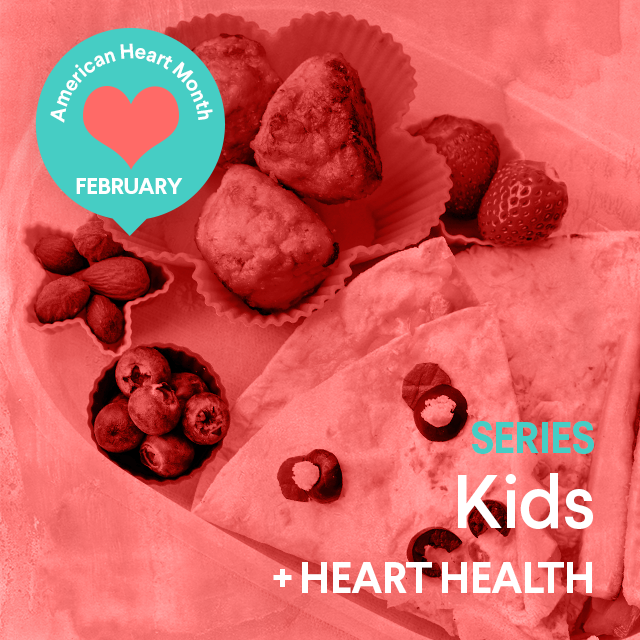This week, as part of our coverage of American Heart Month, we’re tackling the topic of kids and heart health. Childhood is a time to run and play, to sleep long hours, to be stress-free. Unfortunately, today’s kids tend to spend more time on their tech gadgets than the jungle gym.
Academic pressure has them worrying about homework and tests at a shockingly young age. The Modern American Diet is filled with sugar, fat and salt which, combined with a lack of exercise and outdoor time, has paved the way to record-high rates of childhood obesity and type 2 diabetes.

The habits we instill in our kids now can make or break their future heart health. If we help set them up by teaching them easy, fun ways to stay healthy – focusing on active play (which we know is also a form of heart-protective exercise), stress reduction and yummy but good-for-you foods – they will hopefully carry those habits into adulthood.
The American Heart Association has come up with what they call Life’s Simple 7TM – seven crucial tips to instill in our younger generation to keep their hearts healthy now and in the future. Here they are, in no particular order:
Walk, Run and Play Every Day
Whether your child enjoys team sports or individual activities, it’s important for them (and you!) to find ways to be physically active every day. Be sure they refuel with healthy snacks, too, not sugary sports drinks or bars. We recommend this smoothie and our delicious Protein Kefir.
Food is Fuel
High-quality natural food is crucial for overall health, especially in children. A heart-healthy diet includes plenty of fresh fruit, vegetables and whole grains, low-fat dairy (like kefir!), with limited added sugar and trans fat.
It’s Fun to Be Fit!
It’s natural for a person’s body weight to change and fluctuate as they grow, but staying with the physician-recommended healthy weight range will help children feel better overall. Eating a balanced diet and getting plenty of exercise will help this.
Get an Arm Squeezed
Keeping track of and monitoring your child’s blood pressure is a great way to make sure his or her ticker stays in tip-top shape and he or she doesn’t become at risk for hypertension or other heart related diseases.
High Blood Sugar Isn’t So Sweet
Sugary foods and snacks aren’t just bad for a child’s teeth, consumption of them has been linked to the development of type 2 diabetes. Keep these foods as rare treats, or find alternatives to satisfy a sweet tooth.
Plaque Isn’t Just On Your Teeth
If you thought high cholesterol only affected adults, think again. Many children suffer from high cholesterol without knowing it, or are at greater risk for high cholesterol due to family history. If high cholesterol runs in your family, be sure to talk to your pediatrician about whether a test is prudent. Include plenty of prebiotic whole grains and fiber-rich foods in your diet to help keep cholesterol under control.
Say No to Smoking
This one’s a no-brainer: don’t smoke or use tobacco products of any kind. Heart disease, lung cancer and cardiovascular disease are possible “side effects,” not to mention stained teeth and nails, and general sluggishness.
Eat Your Heart Out
If you feel daunted, remember that your making changes for a lifetime of good health, and they all don’t have to happen overnight. Here is their brief list of healthy eating ideas – for kids and adults to get you started:
- Eat plenty of fruits and veggies
- Choose whole-grain foods which can be a good source of dietary fiber
- If you want to snack, go nuts! A serving size is a small handful or 1.5 ounces of whole nuts or 2 tablespoons of nut butter
- Select fat-free (skim), 1%-fat and low-fat dairy product, such as your favorite flavor of kefir
- Eat fish, especially oily fish (salmon, trout, herring), at least twice a week
- Limit the amount of red meat you eat and choose lean meats and poultry. There are also many meat-free alternatives to get protein
- Limit your intake of beverages and foods with added sugars
- Learn about sodium and the common foods that have too much of it
- Drink water instead of sugary drinks